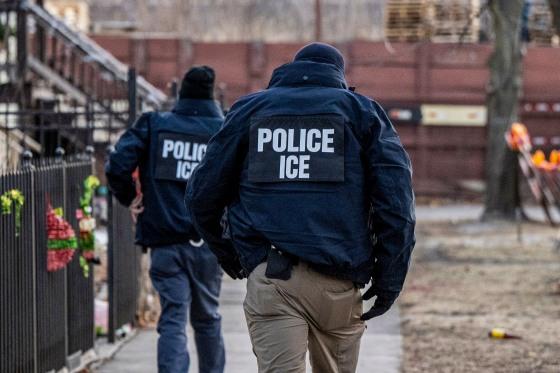Escalation of Federal Immigration Enforcement in Major Cities: Chicago and Boston in Focus
Federal immigration agencies have markedly increased their enforcement activities in prominent urban centers, especially Chicago and Boston, signaling a robust federal initiative amid growing disputes over sanctuary city policies.This intensified enforcement has reverberated across other sanctuary jurisdictions, prompting heightened alertness and strategic reassessments. The surge highlights the persistent friction between local governments committed to protecting immigrant communities and federal entities prioritizing immigration control.
Recent operations have seen enhanced coordination between Immigration and Customs Enforcement (ICE) and municipal law enforcement, targeting individuals with criminal records. While officials assert these measures aim to bolster public safety, they have ignited vigorous debates concerning civil liberties and the sovereignty of local governance.Community advocates in both cities caution that such aggressive tactics risk eroding trust between immigrant populations and law enforcement, potentially hindering collaborative efforts to maintain safety.
Sanctuary cities nationwide are responding by revisiting their policies and emergency protocols to shield vulnerable residents while reaffirming their stance on limited federal cooperation. The underlying causes of these tensions include:
- Broadened federal directives: Recent policies emphasize deporting undocumented immigrants for even minor legal violations.
- Shifts in funding: Increased federal investment in immigration enforcement is altering local law enforcement priorities.
- Community mobilization: Grassroots groups are organizing protests and offering legal support to those at risk of detention.
| City | Number of Recent Detentions | Sanctuary Policy Level | Community Actions |
|---|---|---|---|
| Chicago | Over 120 | Strict Sanctuary | Protests and Legal Aid Clinics |
| Boston | 85 | Strong Sanctuary | Community Forums and Advocacy Campaigns |
| Los Angeles | Data Not Available | Sanctuary City | Increased Monitoring and Preparedness |
Sanctuary Cities Strengthen Resilience Amid Federal Immigration Crackdowns
In light of the recent uptick in federal immigration enforcement, sanctuary city administrations are intensifying their protective measures. Officials in cities like Chicago and Boston express apprehension about the potential rise in detentions and deportations,which could disrupt family units and overwhelm social support systems. To counter these challenges, local governments are collaborating closely with law enforcement and nonprofit legal organizations to uphold immigrant rights and maintain open communication channels with affected communities.
Proactive strategies being adopted include:
- Expanded outreach initiatives: Educating residents about their legal rights and available community resources.
- Robust legal defense networks: Offering comprehensive legal assistance to those facing immigration proceedings.
- Real-time monitoring systems: Tracking federal enforcement activities to evaluate their impact on local populations.
| City | Recent Federal Enforcement Actions | Community Response Initiatives |
|---|---|---|
| Chicago | Multiple ICE raids targeting undocumented workers | 24/7 Legal Aid Hotline Established |
| Boston | Increased immigration checkpoints near immigrant neighborhoods | Workshops at City Hall on Rights and Protections |
| San Francisco | Heightened Border Patrol presence | Expanded Sanctuary Policies and Police Training Programs |
Guidance from Legal Experts and Advocates for Immigrant Communities Facing Heightened Enforcement
As federal immigration enforcement intensifies, legal professionals and advocacy groups are mobilizing to equip immigrant residents with essential knowledge and support. Attorneys stress the importance of understanding one’s rights during interactions with law enforcement and immigration officials, advising individuals to stay composed, request legal representation, and refrain from signing any documents without legal counsel. Community organizations have increased the availability of free legal clinics and educational sessions to help residents navigate the complex enforcement surroundings safely.
Experts recommend the following precautions:
- Keep identification handy: Carry necessary documents but avoid volunteering excessive personal details beyond your name and immigration status.
- Know your rights: Be aware of the right to remain silent and the right to deny searches without a warrant.
- Prepare emergency contacts: Share trusted contacts with local organizations that can provide assistance if detention occurs.
- Secure legal representation early: Engage qualified immigration attorneys promptly to prepare for any legal proceedings.
| Association | Contact Number | Services Offered |
|---|---|---|
| Chicago Immigrant Legal Support | (312) 555-0198 | Free Consultations and Legal Workshops |
| Boston Immigrant Defense Network | (617) 555-0222 | Emergency Hotline and Legal Representation |
| Sanctuary Rights Coalition | (844) 555-0303 | Know Your Rights Training and Advocacy |
Municipal Leaders Call for Policy Reform to Mitigate Enforcement Impacts
In reaction to the recent intensification of federal immigration enforcement in cities such as Chicago and Boston,local government officials are advocating for comprehensive policy reforms. They highlight that aggressive enforcement disrupts community trust and places additional burdens on local services, complicating efforts to deliver essential support. Leaders warn that without updated policies, the crackdown risks alienating immigrant communities and undermining public safety, as fear of law enforcement deters residents from accessing vital municipal programs.
Key policy recommendations from city officials include:
- Establishing clear protocols that harmonize federal enforcement with local sanctuary policies
- Increasing funding for immigrant legal aid and social support services
- Enhancing communication and cooperation channels between federal and local agencies
- Implementing protections to ensure immigrants can access healthcare and education without fear
Municipal leaders urge federal lawmakers and the management to pursue nuanced reforms that respect local autonomy while addressing federal immigration priorities, viewing this balance as critical to preserving community cohesion amid ongoing enforcement efforts.
Conclusion
As federal immigration enforcement escalates in key cities like Chicago and Boston, sanctuary jurisdictions across the country are preparing for potential ripple effects on their communities. This evolving scenario highlights the persistent tension between local governments committed to immigrant protections and federal agencies focused on immigration control. Stakeholders will be closely observing how these developments influence public safety, community trust, and the broader national discourse on immigration policy reform.




